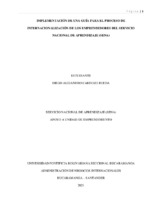Implementación de una guía para el proceso de internacionalización de los emprendedores del Servicio Nacional de Aprendizaje (SENA)

Fecha
2021Director/Asesor
Sarmiento Suárez, Jaime Enrique
Tipo de contenido
Práctica
Citación
Metadatos
Mostrar el registro completo del ítemDocumentos PDF
Resumen
En el Servicio Nacional de Aprendizaje (SENA) implementó procesos estratégicos de
internacionalización con los aprendices adscritos, que terminaron su etapa lectiva e iniciaban su
etapa productiva, para ello se evaluó sus emprendimientos para analizar profundamente y
contextualizar su intención de abarcar un mercado internacional que les permitiera desarrollarse
empresarial, comercial y económicamente. La internacionalización tiene diversos compuestos
importantes: Es un proceso que se desarrolla gradualmente, no es algo que está determinado
en un tiempo definido, sino que se va desarrollando por diversas etapas al transcurrir del tiempo.
Es un proceso, el cual requiere un desgaste de tiempo y una gran dedicación, evoluciona a
través de etapas y mucha preparación. Este proceso es directamente proporcional a la actividad
de la empresa, y a las actividades que se desempeñan dichas empresas, las cuales crecen
considerablemente con la internacionalización. Podemos afirmar, que, por consecuencia de la
internacionalización de su actividad, la empresa sufre cambios en su estructura, en su
funcionamiento, en su operación en general. Esté proceso implica incursionar en países
extranjeros que pueden ser de muy diversos tipos: vender sus productos, comprar inputs,
invertir, etc.- en otros mercados distintos al mercado nacional o doméstico. Se cumple una
función esencial y determinante para el desarrollo de nuestro país ya que, si contamos cada vez
más con emprendimientos que logren posesionarse a nivel global, tendremos sin duda alguna
más flujo de dinero y con ello inversión, desarrollo y empleo en nuestro territorio nacional. In the National Learning Service (SENA), strategic internationalization processes were
implemented with the attached apprentices, who finished their teaching stage and began their
productive stage, for this, their undertakings were evaluated to deeply analyze and contextualize
their intention to cover an international market that allow them to develop business, commercial
and economically. Internationalization has several important components: It is a process that
develops over time, it is not something static, a step or change that occurs at a given moment,
but it evolves through various stages. It is a process, therefore, that implies dedication and time,
evolves through stages and a lot of preparation. This process directly influences the activity of
the company, its activity, its \"business\", which acquires a new dimension with
internationalization. In other words, as a result of the internationalization of its activity, the
company reveals changes in its operation, in its structure, in its way of operating in general. And,
perhaps the most determining element of all, and as the very word \"internationalization\"
indicates, this process implies the development of activities outside the country where the
company is originally from. Internationalization implies “leaving” the borders of the country,
developing business activities of the company –which can be of very different types: selling their
products, buying inputs, investing, etc.- in markets other than the national or domestic market.
An essential and decisive function is fulfilled for the development of our country since, if we have
more and more enterprises that manage to take over at a global level, we will undoubtedly have
more money flow and with it investment, development and employment in our national territory.
Palabra/s clave
Globalización
Innovación
Internacionalización.
Colecciones
- Trabajos de grado [6698]
El ítem tiene asociados los siguientes ficheros de licencia:

